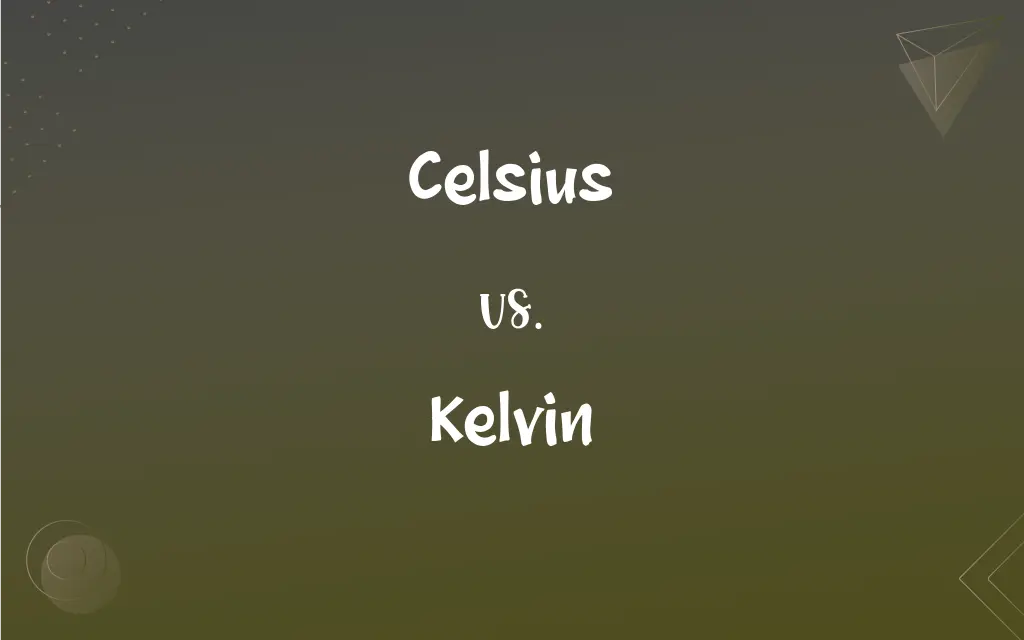Celsius vs. Kelvin: What's the Difference?
Edited by Harlon Moss || By Janet White || Updated on November 28, 2023
Celsius is a temperature scale with water freezing at 0° and boiling at 100°, while Kelvin starts at absolute zero, with no negative temperatures.

Key Differences
Celsius, a unit of temperature commonly used in daily life, measures water's freezing point at 0 degrees and boiling point at 100 degrees. Kelvin, in scientific contexts, sets its zero point at absolute zero, the theoretically coldest possible temperature.
Celsius is often used in weather forecasts, making it relatable for general public understanding. Kelvin, however, is prevalent in scientific research, particularly areas studying extremely low temperatures, like cryogenics.
Celsius degrees are each equivalent to a Kelvin, but the scales start at different points, with Kelvin being 273.15 degrees higher. Therefore, temperature conversions between the two systems require mathematical adjustments.
Celsius is a crucial part of the metric system, utilized worldwide for various temperature-related measurements. Kelvin is the SI unit for temperature, fundamental in scientific equations, and calculations, especially in thermodynamics.
Celsius, easily relatable in everyday experiences like cooking or traveling, helps people globally navigate temperature-sensitive tasks. Kelvin, being absolute, aids scientists in avoiding negative numbers, simplifying certain thermodynamic equations like those used in the study of gases.
ADVERTISEMENT
Comparison Chart
Zero Point
0°C (freezing point of water)
0K (absolute zero)
Usage
Daily activities, weather reports
Scientific research, thermodynamics
Measurement
Degrees Celsius (°C)
Kelvins (K)
Range
Typically from -100°C to 100°C
Starts at 0K, no negative numbers
Relation to Water
Freezing at 0°C, boiling at 100°C
Freezing at 273.15K, boiling at 373.15K
ADVERTISEMENT
Celsius and Kelvin Definitions
Celsius
Part of the centigrade system with 100 degrees between freezing and boiling of water.
At 100 degrees Celsius, water begins to boil.
Kelvin
The SI unit of thermodynamic temperature, starting at absolute zero.
This substance freezes at 255.37 Kelvin.
Celsius
Named after the astronomer Anders Celsius.
Did you know the Celsius scale is named after a Swedish scientist?
Kelvin
Used in scientific contexts, especially in the study of extreme temperatures.
We use Kelvin in cryogenic temperature measurements.
Celsius
A scale for measuring temperature, where water freezes at 0 degrees.
The forecast says it's 20 degrees Celsius outside.
Kelvin
A scale with no negative values, simplifying many scientific calculations.
At zero Kelvin, also known as absolute zero, all molecular motion ceases.
Celsius
Commonly used in daily life for weather temperature.
It's chilly today, maybe 5 degrees Celsius.
Kelvin
Named after the physicist William Thomson, 1st Baron Kelvin.
The Kelvin scale was named after a prominent British scientist.
Celsius
A metric unit of temperature used worldwide.
This oven can heat up to 250 degrees Celsius.
Kelvin
A unit of absolute temperature equal to 1/273.16 of the absolute temperature of the triple point of water. One kelvin degree is equal to one Celsius degree. See Table at measurement.
Celsius
Of or relating to a temperature scale that registers the freezing point of water as 0° and the boiling point as 100° under normal atmospheric pressure. See Table at measurement.
Kelvin
Kelvin A temperature scale in which zero occurs at absolute zero and each degree equals one kelvin. Water freezes at 273.15 K and boils at 373.15 K.
Celsius
Alternative case form of Celsius
Kelvin
In the International System of Units, the base unit of thermodynamic temperature; 273.16 of the thermodynamic temperature of the triple point of water. Shown as "K".
Celsius
The Celsius thermometer or scale, so called from Anders Celsius, a Swedish astronomer, who invented it. It is the same as the centigrade thermometer or scale.
Kelvin
A unit interval on the Kelvin scale.
The interval between the freezing and boiling points of water is 100 kelvins.
Celsius
Swedish astronomer who devised the centigrade thermometer (1701-1744)
Kelvin
(usually as postpositioned adjective) A unit for a specific temperature on the Kelvin scale.
Ice melts above 273.15 kelvins.
Water boils above 373.15 kelvins.
Kelvin
The SI unit of temperature, defined as being 1/273.16 of the triple point of water; abbreviated K. The melting point of water at 760 mm pressure is 273.15 Kelvins, and the boiling point 373.15 Kelvins. One degree Kelvin is equal to one degree Centigrade, and
Kelvin
The basic unit of thermodynamic temperature adopted under the Systeme International d'Unites
Kelvin
British physicist who invented the Kelvin scale of temperature and pioneered undersea telegraphy (1824-1907)
Kelvin
Essential in expressing laws of thermodynamics.
In this experiment, we calculate temperature in Kelvin for accuracy.
FAQs
Is Celsius used in science?
Yes, though Kelvin is preferred for scientific research.
Which is larger, a degree Celsius or a Kelvin?
They are equivalent, but the scales have different starting points.
What's water's boiling point in Kelvin?
Water boils at 373.15 Kelvin.
Is Celsius used in the United States?
No, the United States primarily uses Fahrenheit.
What's absolute zero in Celsius?
Absolute zero is -273.15 degrees Celsius.
Why is Kelvin used in science?
Its starting point of absolute zero avoids negative temperatures, simplifying calculations.
What's the symbol for Kelvin?
It's represented by the letter K.
How do you convert Celsius to Kelvin?
Add 273.15 to the Celsius temperature.
Can Kelvin have negative values?
No, Kelvin starts at absolute zero, the lowest limit.
Why doesn't Kelvin use the degree symbol?
It's an SI unit, which doesn't use degree symbols.
Who created the Celsius scale?
It was developed by Anders Celsius, a Swedish astronomer.
Can you use Kelvin in everyday life?
It's primarily for scientific use, not common in daily activities.
Do all countries use Celsius for weather reporting?
Most do, except for a few like the U.S., which uses Fahrenheit.
How do I convert Kelvin to Celsius?
Subtract 273.15 from the Kelvin temperature.
Is the Celsius scale linear?
Yes, it's a linear scale.
What's common between Celsius and Kelvin?
Both are units of temperature measurement.
Are Celsius and Kelvin interchangeable?
No, they require conversion, but are similar in size.
Is the Kelvin scale linear?
Yes, like Celsius, it's also linear.
What's the symbol for Celsius?
The symbol is °C.
Is Celsius used in space science?
Kelvin is more common due to its absolute nature.
About Author
Written by
Janet WhiteJanet White has been an esteemed writer and blogger for Difference Wiki. Holding a Master's degree in Science and Medical Journalism from the prestigious Boston University, she has consistently demonstrated her expertise and passion for her field. When she's not immersed in her work, Janet relishes her time exercising, delving into a good book, and cherishing moments with friends and family.
Edited by
Harlon MossHarlon is a seasoned quality moderator and accomplished content writer for Difference Wiki. An alumnus of the prestigious University of California, he earned his degree in Computer Science. Leveraging his academic background, Harlon brings a meticulous and informed perspective to his work, ensuring content accuracy and excellence.































































